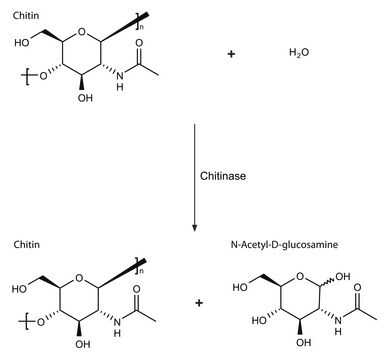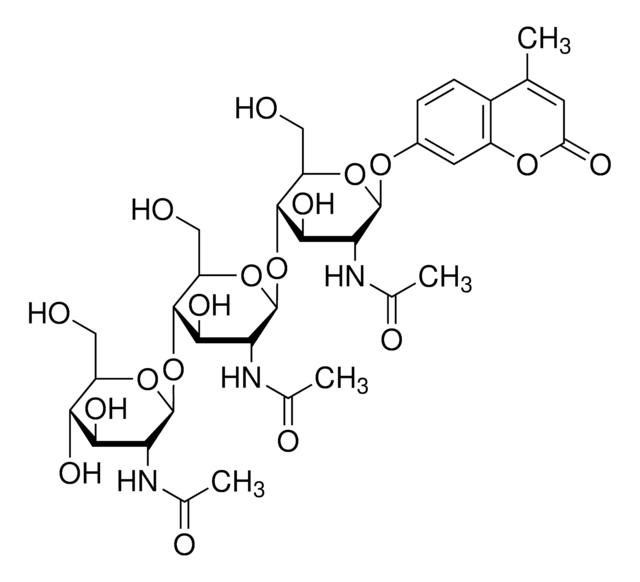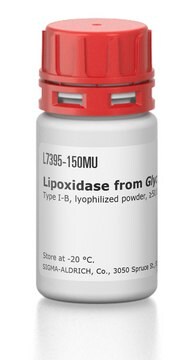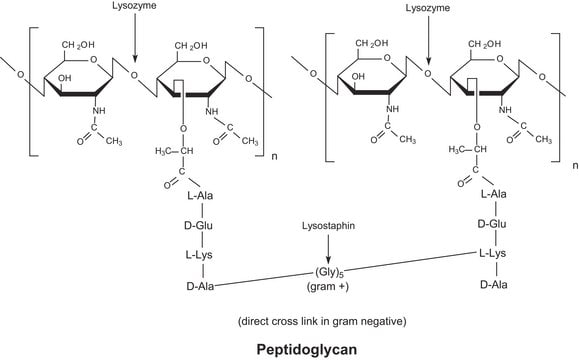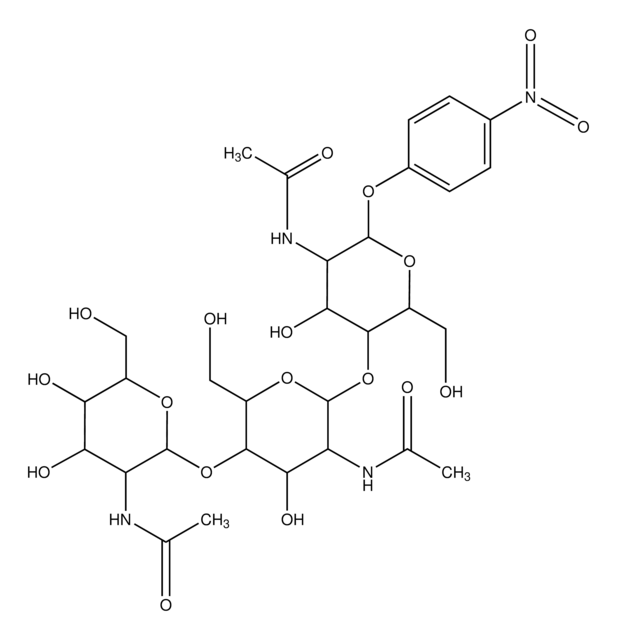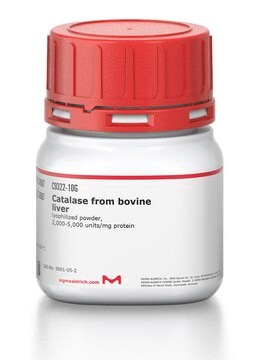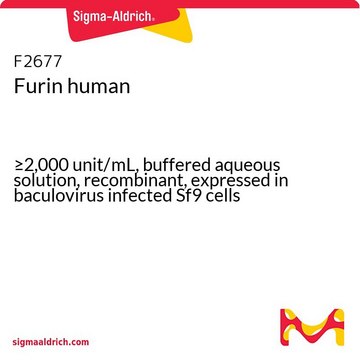SAE0052
Chitotriosidase human
recombinant, expressed in HEK 293 cells
Synonym(s):
Chitinase-1, Chitotriosidase-1
Sign Into View Organizational & Contract Pricing
All Photos(2)
About This Item
Recommended Products
recombinant
expressed in HEK 293 cells
Quality Level
Assay
98% (SDS-PAGE)
form
lyophilized powder
specific activity
≥15,000 units/μg protein
mol wt
50 kDa
shipped in
ambient
storage temp.
−20°C
General description
Chitotriosidase (CT) is a human chitinase with catalytic activity upon the substrate chitin, a polymer of ?-1,4-N-acetylglucosamine. The mature CT consists of 445 amino acids, and contains a potential N-glycosylation site as well as three intrachain disulfide bonds.
Application
The enzymatic activity of recombinant human CT is measured by its ability to hydrolyze the substrate 4-Methylumbelliferyl beta -D-N,N′,N”-triacetylchitotriose (Cat. # M5639). This enzymatic hydrolysis releases 4-methylumbelliferone (4MU), which upon ionization in basic pH, can be measured fluorimetrically at an excitation wavelength of 340 nm and an emission wavelength of 465 nm. The use of fluorimetric substrates provides a very sensitive detection system.
Biochem/physiol Actions
CT is currently the most reliable biomarker in Gaucher disease - serum and plasma CT activity is usually measured as the first step in diagnosis of Gaucher disease. Monitoring chitotriosidase activity is widely used during treatment of this pathology by enzyme replacement therapy. Its elevated plasma level reflects gradual intralysosomal accumulation in Gaucher cells (lipid-loaded macrophages). Macrophages overloaded by the enzyme accumulated in lysosomal material (lipids) were shown to secrete chitotriosidase; its increased expression was noted in several lysosomal storage diseases and atherosclerosis.
Sequence
AKLVCYFTNWAQYRQGEARFLPKDLDPSLCTHLIYAFAGMTNHQLSTTEWNDETLYQEFNGLKKMNPKLKTLLAIGGWNFGTQKFTDMVATANNRQTFVNSAIRFLRKYSFDGLDLDWEYPGSQGSPAVDKERFTTLVQDLANAFQQEAQTSGKERLLLSAAVPAGQTYVDAGYEVDKIAQNLDFVNLMAYDFHGSWEKVTGHNSPLYKRQEESGAAASLNVDAAVQQWLQKGTPASKLILGMPTYGRSFTLASSSDTRVGAPATGSGTPGPFTKEGGMLAYYEVCSWKGATKQRIQDQKVPYIFRDNQWVGFDDVESFKTKVSYLKQKGLGGAMVWALDLDDFAGFSCNQGRYPLIQTLRQELSLPYLPSGTPELEVPKPGQPSEPEHGPSPGQDTFCQGKADGLYPNPRERSSFYSCAAGRLFQQSCPTGLVFSNSCKCCTWNGHHHHHHHHGQ
Unit Definition
One unit is defined as the amount of CT required to produce 1 pmol of 4-Methylumbelliferone from 4-Methylumbelliferyl beta -D-
N′,N”-triacetylchitotrioside per minute at 25 °C, pH 5.6.
N′,N”-triacetylchitotrioside per minute at 25 °C, pH 5.6.
Physical form
Supplied as a lyophilized powder containing phosphate buffered saline
Storage Class Code
10 - Combustible liquids
WGK
WGK 1
Flash Point(F)
Not applicable
Flash Point(C)
Not applicable
Choose from one of the most recent versions:
Certificates of Analysis (COA)
Lot/Batch Number
Don't see the Right Version?
If you require a particular version, you can look up a specific certificate by the Lot or Batch number.
Already Own This Product?
Find documentation for the products that you have recently purchased in the Document Library.
Zhi Liao et al.
PloS one, 14(7), e0219699-e0219699 (2019-07-20)
For understanding the structural characteristics and the proteome of Perna shell, the microstructure, polymorph, and protein composition of the adult Perna viridis shell were investigated. The P. viridis shell have two distinct mineral layers, myostracum and nacre, with the same
Our team of scientists has experience in all areas of research including Life Science, Material Science, Chemical Synthesis, Chromatography, Analytical and many others.
Contact Technical Service